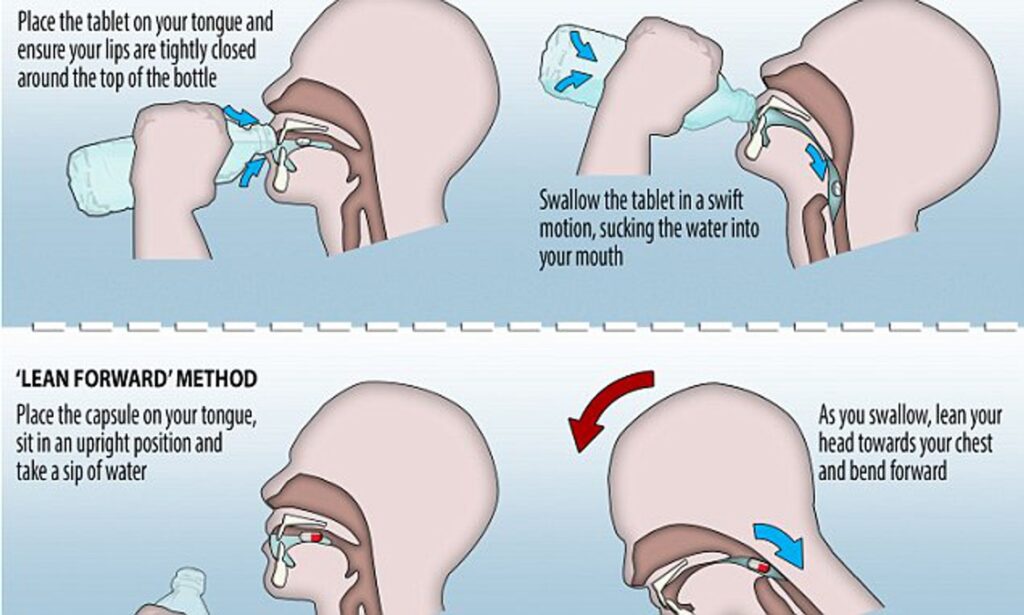The expression that something is “a hard pill to swallow” isn’t just a metaphor. Swallowing pills can be difficult and downright unpleasant. It causes one in three people to gag, vomit, or choke. That may keep people from sticking to their medication routines, which can make them sicker.
“We often see people who can swallow food and liquid just fine but have difficulty with pills. Some people have an aversion to swallowing pills, and others have physical issues that affect their ability to swallow,” says Denise Ambrosi, director of the Speech-Language Pathology Department at Harvard-affiliated Spaulding Rehabilitation Hospital.
How to swallow a pill
A study by researchers from the University of Heidelberg in Germany may help people with pill swallowing difficulties. They suggest two techniques that can help people improve their ability to get medicine down. Their report was published in the Annals of Family Medicine.
The pop-bottle method is designed for swallowing tablets:
- Fill a plastic water or soda bottle with water.
- Put the tablet on your tongue and close your lips tightly around the bottle opening.
- Take a drink, keeping contact between the bottle and your lips and using a sucking motion to swallow the water and pill. Don’t let air get into the bottle.
Researchers asked about 140 people with difficulty swallowing pills to test this method with their eyes closed, swallowing large and very large pills. The result: a 60% improvement in swallowing over the old method of just taking a sip of water from a cup and trying to swallow.
Study participants had even more success with a technique for swallowing capsules called the lean-forward method:
- Put a capsule on your tongue.
- Take a sip of water but don’t swallow.
- Tilt your chin toward your chest.
- Swallow the capsule and water while your head is bent.
This technique showed an improvement of 89% over the old method of taking a sip of water from a cup and trying to swallow.
You can download a handout demonstrating these techniques from the Annals of Family Medicine.
Don’t try this at home
But don’t rush to try out these pill-swallowing techniques, warns Ambrosi. “The study mainly found that people’s perceptions of pill swallowing changed,” she says. It’s true; researchers only asked participants if their pills went down easier, they didn’t get any images of what was happening physiologically during the swallowing tests or measure physical differences.
So, it’s not a given that one of these methods will work for you or be safe for you, especially if you have a hard time swallowing pills. “You’ll need a thorough assessment first. Maybe there’s something causing the swallowing problems that would only be identified with an instrumental swallowing assessment,” says Ambrosi.
Difficulty swallowing is called dysphagia. It can be caused by problems with nerves or muscles. Quite a few of those are involved in the swallowing process — 25 pairs of muscles in the mouth and throat help prepare your food for swallowing. When you swallow, your airway closes, and you stop breathing for a moment. Trouble with the coordination of any of the nerves and muscles involved in the process can lead to choking or getting food or liquid into your lungs, potentially causing a type of pneumonia.
What you can do to help swallow pills more easily
Until you know what’s behind your swallowing issues, here are a few things you can do to make swallowing medicine a little easier:
- Put a pill in applesauce or pudding. The texture can make it easier to swallow pills whole.
- Grind a pill into a powder and add it to applesauce or pudding.
- Cut a pill with a pill splitter and swallow the smaller pieces one by one.
Make sure you ask your pharmacist if it’s okay to cut or grind a medication. Timed-release or enteric-coated medicines shouldn’t be broken apart. It may also be possible to get your medicine in another form, such as a powder, cream, or liquid, so don’t hesitate to ask.
If you have trouble swallowing pills or anything else, don’t put off getting an evaluation. Start with your primary care physician, who will likely refer you to an ear, nose, and throat specialist or to a speech-language pathologist for a swallowing assessment. Facing the possibility that you have a swallowing disorder may be a hard pill to swallow but learning ways to overcome it will make your future of taking medication a lot safer.
Source: health.harvard.edu





Be the first to write a comment.